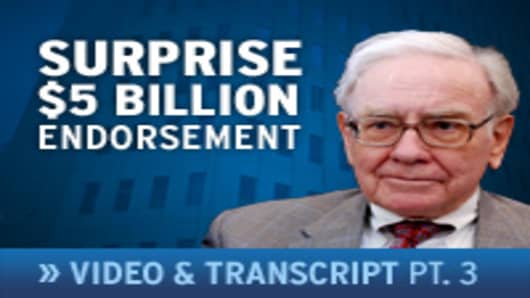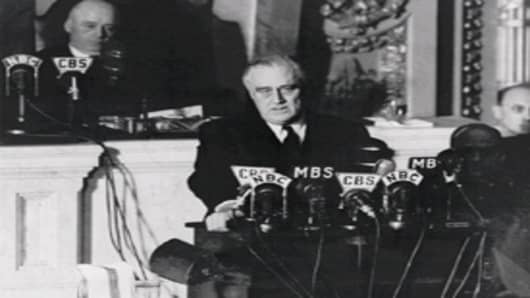BUFFETT: They can make money on this deal. I can tell you this. I would love to have 700-billion at Treasury rates to be able to buy fixed-income securities now that they're in distress. There's a lot of money to be made.
JOE: It's just that, you know, they want these details, Warren. They said -- Paulson says there's the hold-to-maturity price and there's the firesale price. We're going to go somewhere in between, get a much better price but still leave enough for the people that are buying it to make some money. That can be done in principle? There's a way to do that, do you think?
BUFFETT: I think what I would be looking for -- I heard that hold-to-maturity price. I'm not as excited about that. I basically like a market, or something very close to a market-related price. And there are ways to determine that and I don't think that Uncle Sam should be in the business of paying somebody a whole lot more than it's worth in the market today. And if the guy that bought it doesn't like it, he doesn't have to sell it, and it was his problem, he bought it in the first place. I think a market price will enable people to be leveraged. The problem they have now is that some of the institutions, they're loaded with this stuff, they're having trouble funding, and they're worried about being able to sell a ton of it. But take the Merrill Lynch deal. Merrill Lynch had to take back 75 percent of the sales price. Well, they didn't want to take back that 75 percent. I would let 'em sell it for the same price, but I'd pay them the whole thing in cash. So they'd be a lot better off if they could have sold the whole thing at that same price but gotten paid a hundred percent in cash instead of having to take back 75 percent. And I see the government fulfilling that kind of a function.
JOE: All the outrage we're seeing in these comments from viewers, and obviously the senators are hearing from constituents. If we take your word for it, that the government could even break-even, or only lose 50 billion, that 700 billion dollar number is out there in the public, and people think that we're spending that.
BUFFETT: Yeah, they think that, yeah.
JOE: It seems crucially important to get the point across that, in your view, we could, the government could actually end up making money and saving the taxpayer from much worse, a much worse outcome if we didn't do this.
BUFFETT: The government is getting 700 billion worth of assets, assuming they spend the 700 billion, they're getting 700 billion of assets at what I regard as attractive prices. And they've got the staying power to hold those things. If I could get 700 billion, if I could borrow 700 billion on the government's terms and buy these assets I'd be doing it myself. But unfortunately I'm tapped out. (Laughs.)
BECKY: And yet, Warren, Mayor Mike Bloomberg, I heard him making comments this morning, and he's someone I know you've spoken very highly of ..
BUFFETT: I admire him.
BECKY: You admire him. he says this morning we should not be giving a blank check to have something passed in the dead of night. How dire is this situation?
BUFFETT: Well, I'm sure we didn't want to go to war on December 7, 1941, maybe, in the dead of night, or whenever we did it, in the middle of the afternoon actually. But there are time when events force timetables on you, and force action, and you have to be -- You know, it's just like in my business. I might like to think over buying something for a month, I'm not that type anyway. But in the end, if somebody offers me something that makes sense, I better decide whether to act or not. And if it makes sense to me, I usually don't attach unnecessary conditions, you know. It would be nice to have the luxury of thinking about this for three months. But I will tell you, if you think about this for three months, you're going to have a situation where -- If you think about it for three weeks, you're going to be facing a situation that's far different, and far more difficult, than if you do something now.
END OF TRANSCRIPT
Current Berkshire stock prices:
Class A:
Class B:
Goldman Sachs:
Questions? Comments? Email me at buffettwatch@cnbc.com




